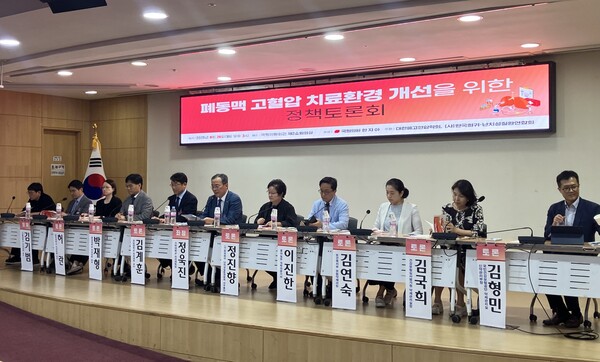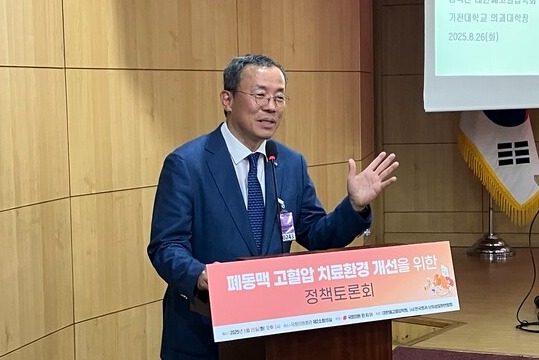At a National Assembly policy debate held to improve the treatment environment for pulmonary arterial hypertension (PAH), doctors who spoke at the forum were overcome with emotion and could barely continue their remarks, thinking of patients who passed away without ever getting proper medication.
PAH is a rare, severe, and incurable disease where the walls of the pulmonary arteries abnormally thicken and narrow, causing extreme shortness of breath and palpitations. In the long run, it leads to heart failure and death. Patients in the high-risk group, whose average survival period is only 2.8 years, have a mortality rate exceeding 20 percent within one year. About 30 percent of patients in Korea die within five years of diagnosis.
However, the treatment environment in Korea is so poor that even the first-line treatment, developed 30 years ago and approved in all OECD countries, is unavailable.

Professor Kim Kye-hun of the Department of Cardiology at Chonnam National University Hospital, during a “Policy Discussion Forum for Improving the Treatment Environment for Pulmonary Arterial Hypertension” held at the National Assembly on Tuesday, introduced the story of a sixth-grade elementary school patient diagnosed with PAH.
Professor Kim was overcome with emotion and momentarily lost his words. The patient was too young to receive available treatments. After exhausting all avenues, Professor Kim Gi-beom of Seoul National University Hospital's Department of Pediatrics and Adolescent Medicine found a way to treat the patient with off-label drugs. Preparations were underway to transfer the patient, but the child passed away before that time could be secured.
PHA is an extremely dangerous disease. Once the disease progresses, it becomes extremely difficult to reverse, making early diagnosis paramount,” said Professor Kim Kye-hun, who is also the incoming president of the Korean Society of Pulmonary Hypertension (KSPH). “Even after diagnosis, effective treatment requires the ability to administer multiple drugs simultaneously from the outset, not a stepwise increase of a single agent. Treatment based on current standards is insufficient to survive in this war-like situation."
Dr. Jeong Wook-jin of Gachon University Gil Medical Center, the incumbent president of KSPH, criticized the reality that epoprostenol, recommended as a first-line treatment for PAH in Korean and international guidelines, has yet to be introduced to this country.

Jeong noted that in high-risk groups, prostacyclin agents (PCA) like epoprostenol are recommended not only in U.S., European, and Japanese guidelines but also in the upcoming Korean guidelines. However, he pointed out that epoprostenol is not included, meaning an unmet need still exists for critically ill patients.
Developed over 30 years ago, epoprostenol remains the only drug not introduced in Korea among OECD member countries. GSK, which holds the original drug Flolan, and Janssen, which holds the improved drug Veletri, still have no plans for their Korean launch.
“The reason multinational pharmaceutical companies are bypassing Korea is precisely due to the low drug pricing system,” Jeong said. “They say that because our market is small and drug prices are low, they would have to accept losses the moment they enter. Especially for rare drugs, if they enter Korea at a low price, it affects other countries, too, so they'd rather bypass Korea altogether.”
Jeong continued, “Both companies are generating profits from other drugs. We are persuading them to allow this drug to enter Korea, even at a loss, for the sake of our citizens' health. We will wait until November. If nothing happens, I will stage a one-person protest in front of GSK and Janssen.”
There is also a demand to expand the indications for tadalafil, an erectile dysfunction treatment known to also be effective for PAH.
“This drug has been used for erectile dysfunction for 20 years. Since it's taken once daily, medication adherence is good, but it's not yet approved in Korea for treating PAH,” said Professor Park Jae-hyung of the Department of Cardiology at Chungnam National University Hospital, who serves as the policy director of the KSPH. “Our society is preparing a formal request to the Ministry of Health and Welfare and the Ministry of Food and Drug Safety to expand its indications.”
However, officials from the Ministry of Health and Welfare, the Health Insurance Review and Assessment Service (HIRA), and the National Health Insurance Service (NHIS), who participated in the discussion, while expressing sympathy for the difficulties faced by PAH patients, were reserved in their comments regarding the introduction of the drug and expanding its coverage.
“I was unaware that there are PAH drugs available abroad but not introduced to Korea,” said Kim Guk-hee, head of HIRA's Drug Management Office. “There are few treatments for rare diseases, making it all the more regrettable that we have a weapon for PAH but cannot use it.”
Kim continued, “While it's better to treat the disease early with combination therapy rather than adding drugs stepwise as it worsens, we seem to be in a transitional phase. Research is ongoing not only for PAH but also for anticancer drugs and all diseases. HIRA is actively reviewing and reflecting on this.”
However, she drew a line, stating that the issue of introducing older drugs is not something that can be resolved solely by government efforts.
“First, approval is the responsibility of the pharmaceutical company. There is no way for the government to list or cover drugs that have not even been applied for,” Kim said.
Regarding academic societies' requests for faster introduction through the “approval-evaluation-negotiation linkage system” when companies apply for approval, she said, “This linkage doesn't guarantee coverage. It's a situation that requires joint effort, as it can't be achieved by one party alone.”
Kim Yeon-sook, director of the Insurance and Pharmaceuticals Division at the Ministry of Health and Welfare, also stated, “For rare, severe, and intractable diseases, rapid introduction and proper compensation are needed to enhance patient access. Ironically, the small number of patients limits the data available, and from the industry's perspective, business viability must be considered, creating obstacles.”
Kim added, “Please gather ideas so we can overcome this together. We will continue to communicate and strive.”
Related articles
- MSD’s Winrevair arrives in Korea but meets hurdles of older PAH drugs
- Despite new drug approvals, Korea's PAH treatment still lags behind global standards
- MSD scores Korean approval for pulmonary arterial hypertension drug Winrevair
- Korean PAH patients deperately hope GSK ends 30 years of inaction
- 'High blood pressure is never healthy -- even in old age'
- 'Sotatercept slashes death risk by 76% in pulmonary arterial hypertension'

